Online gaming addiction: signs, risk factors, and treatment
Table of content
- What is online gaming addiction?
- What are the signs of online gaming addiction?
- What are the risk factors of online gaming addiction?
- 1. Age
- 2. High-speed internet
- 3. Personality traits
- 4. Lack of alternative activities
- 5. Mental health issues
- 6. Social isolation
- 7. Competitive environment
- 8. Peer pressure
- 9. Escapism
- 10. Accessibility
- 11. Rewards and progression systems
- 12. Parental involvement
- What are some of the common triggers that lead to excessive online gaming?
- Where can you seek an online gaming addiction diagnosis?
- What are the treatments available for online gaming addiction?
- When to seek treatment for online gaming addiction?
- What are some effective strategies for managing online gaming addiction?
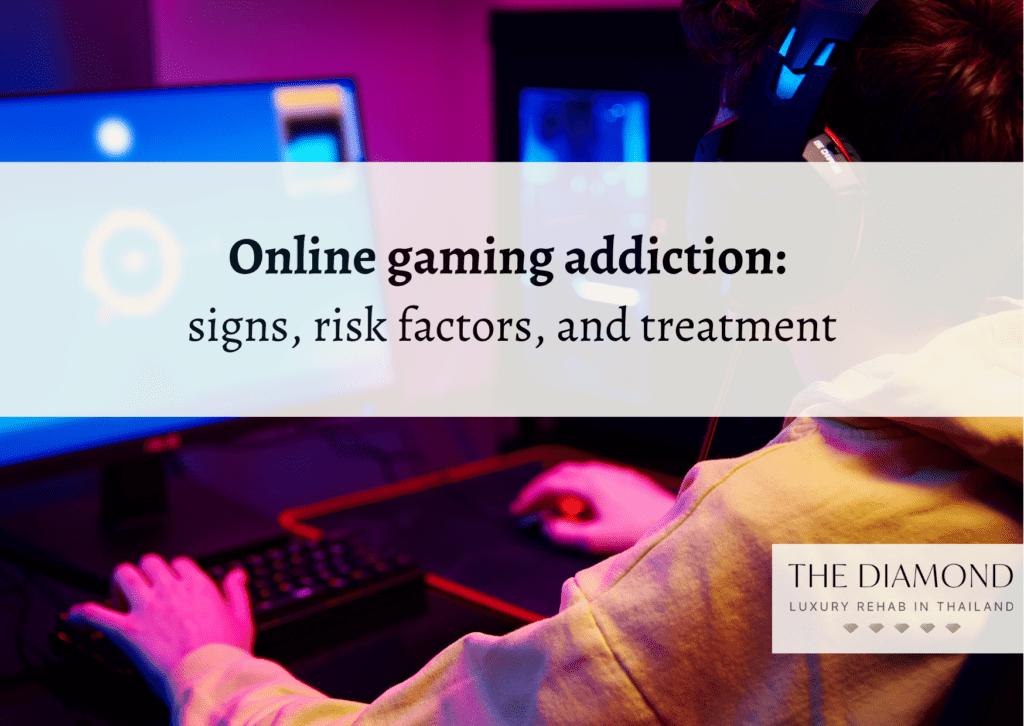
Online gaming addiction refers to prolonged and excessive online gaming behaviors that can cause physical and psychological issues. Gaming addiction symptoms include preoccupation with gaming, deception and secrecy, withdrawal symptoms, excessive hours of gameplay, and neglecting other responsibilities.
The causes of addiction to online games include mental health issues, dopamine desensitization, seeking escapism, social isolation, and peer pressure. The treatment options available for those addicted to video games include cognitive behavioral therapy, group therapy, family counseling, medications, and a 12-step program.
The risk factors that could lead to an addiction to video games include age, high-speed internet, parental involvement, competitive environment, and a lack of alternative activities.
What is online gaming addiction?
Online gaming addiction refers to a gaming behavior pattern that is so severe and frequent that it causes considerable issues in social, family, personal, work, or academic life. The World Health Organization has included Gaming Disorder (GD) as a clinically recognizable and significant syndrome in the 11th edition of the International Classification of Diseases (ICD-11) (2018), according to Dr. Vladimir Poznyak in his 2018 article “Inclusion of ‘Gaming Disorder’ in ICD-11”, published by the World Health Organization.
Despite its inclusion in ICD-11, internet gaming addiction is not officially recognized as a disorder in the Diagnostic and Statistical Manual of Mental Disorders (DSM). However, in 2013 it was added to the section “Conditions For Further Study,” indicating that the American Psychiatric Association requires additional research before possibly recognizing this condition, according to Stephanie A. Sarkis in her 2014 article, “Internet Gaming Disorder in DSM-5,” published by Psychology Today.
Online gaming addiction is characterized by drastically reduced control over gaming behaviors, which could have a negative impact on a person’s relationships, self-care, academic performance, and career.
How does online gaming addiction develop?
Online gaming addiction develops when a person seeks the “dopamine high” that is experienced when winning an online game, according to a 2022 article, “Video Game Addiction,” published on ClevelandClinic. Dopamine is a neurotransmitter produced by the brain that communicates between nerve cells, and it links pleasurable feelings to certain behaviors, which motivates certain actions.
According to Amy Paturel in her 2014 article published in Brain & Life Magazine, excessive exposure to online games can lead to a diminished supply in dopamine production during daily activities. This causes the person to become bored and rely on video games to offer a dopamine surge and thus become addicted to online games.
What are the signs of online gaming addiction?
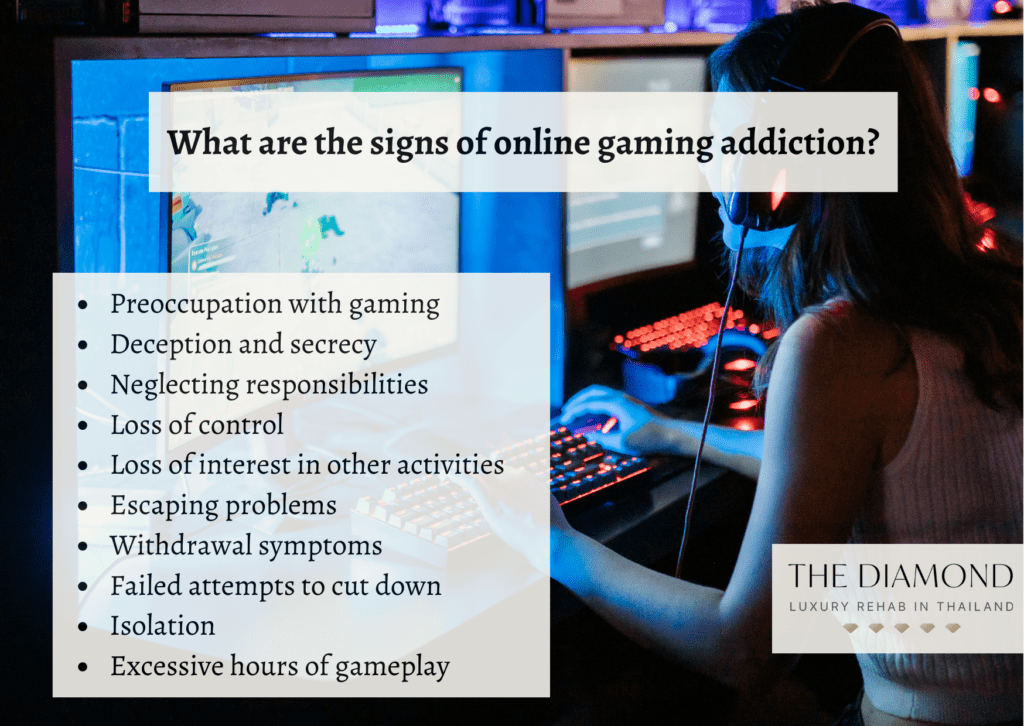
The signs of online gaming addiction are listed below.
- Preoccupation with gaming
- Deception and secrecy
- Neglecting responsibilities
- Loss of control
- Loss of interest in other activities
- Escaping problems
- Withdrawal symptoms
- Failed attempts to cut down
- Isolation
- Excessive hours of gameplay
1. Preoccupation with gaming
A preoccupation with gaming refers to repeated participation in, obsessive thinking about, and consistent talking about gaming. It often leads to significant concentration issues in daily work and or educational tasks.
A person’s preoccupation with gaming might start to bleed into their self-care, social life, and overall academic/career performance. This level of impact indicates that the person’s gaming habits may be turning into a more serious problem that warrants attention and support.
2. Deception and secrecy
Deception and secrecy are behaviors displayed by people who are trying to hide something. In this context, a person battling with excessive online gaming habits might try to hide these habits. Deception and secrecy are frequently utilized by gamers to disguise the degree of their online gaming activities from friends and family.
When a person repeatedly hides or downplays their gaming habits, avoids revealing the extent of their gaming, and makes attempts to keep their gaming behavior secret from others, it is an indication of online gaming addiction. These behaviors suggest a potential lack of control over gaming habits as well as a preference for gaming over other obligations.
3. Neglecting responsibilities
Neglecting responsibilities refers to ignoring certain tasks or duties that one is responsible for. Avoiding obligations to play online games often leads to poor performance in school, work, or other duties, according to Traci Pedersen, in her 2023 article “Gaming Addiction Symptoms You May Want to Look Out For,” published on Healthline.
People struggling with an online gaming addiction prioritize gaming above all other aspects of their lives. They neglect all other responsibilities in order to spend more time gaming and might forfeit their social connections, physical health, and academic or professional pursuits.
4. Loss of control
Online gaming addicts can feel a complete loss of control over their addiction. They may believe that they are incapable of managing their own gaming behavior, according to a 2022 article written by Edward Luker and published by the Mayo Clinic Health System. Many online gaming addicts feel this loss of control over their gaming habits.
Online gaming addicts find it difficult to limit the time that they spend on gaming and even more difficult to stop playing a game once they have started. This behavior severely disrupts their sleep patterns and strains social relationships with others who do not excessively play games.
5. Loss of interest in other activities
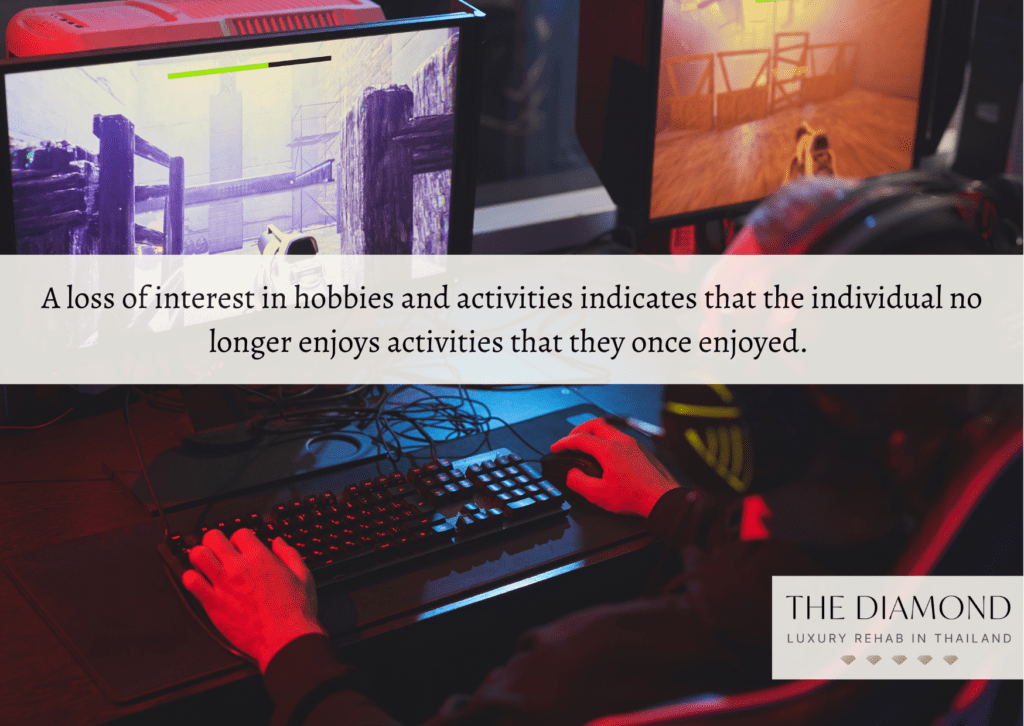
A loss of interest in hobbies and activities indicates that the individual no longer enjoys activities that they once enjoyed. This typically happens without the individual realizing it and might grow gradually over time.
Online gamers find so much satisfaction in online games that they might stop liking activities that they used to enjoy. These activities include sports, cultural activities, or simply hanging out with friends.
6. Escaping problems
Escaping problems refers to choosing certain behaviors or substances to distract oneself from problems or conflicts in their life. In this case, an individual would use online gaming to take their mind off any problems.
Online gamers may use gaming to avoid thinking of or dealing with problems in their family, social, work, or academic lives. However, these problems do not disappear, so the gamer will feel compelled to play for extended periods of time in an attempt to avoid facing their problems.
7. Withdrawal symptoms
Withdrawal symptoms are the physical and/or mental symptoms that occur after a person stops taking part in a behavioral or substance addiction. Experiencing withdrawal symptoms is one of the clear signs of an addiction.
If a gamer starts to exhibit withdrawal symptoms when not able to play games for a few hours, it could be indicative of an addiction. Withdrawal symptoms include irritability, anxiety, or sadness, according to “Internet Gaming,” a 2023 article written by James Sherer and published by the American Psychiatric Association.
8. Failed attempts to cut down
Failed attempts to cut down refers to unsuccessfully trying to reduce or manage one’s dependence on a substance or behavioral pattern. Often this dependence also has a negative impact on one’s daily life. When an addict has failed to cut down on their dependence, additional support from friends and family becomes crucial.
Online gamers might try to regulate the amount of time playing games but fail to do so. It’s not as easy as it seems to cut down on behavioral addiction, and in some cases, they might need external help, such as professional treatment, to help them cut down.
9. Isolation
People who suffer from any form of addiction tend to isolate themselves for a number of reasons, according to Dr. Richard Crabbe in his 2022 article “The Sad Connection Between Addiction and Isolation.” Most often, addicts isolate themselves due to shame or guilt of their addiction or trying to hide their addiction.
Online gaming addicts isolate themselves physically to play online games with other people over the internet. They will also isolate themselves emotionally from their family and friends and prefer to spend time with their online gaming friends, who they feel won’t judge them.
10. Excessive hours of gameplay
Excessive gameplay refers to playing for so many hours that eating, sleeping, and other obligations are neglected. The exact amount isn’t set in stone since it varies for everyone, but generally, playing more than 3-5 hours a day is considered excessive.
When a person’s gameplay causes them to skip school/work, eat and sleep less, or withdraw from their social life, it could be a sign of excessive gameplay. Friends and family should offer their support.
What are the risk factors of online gaming addiction?
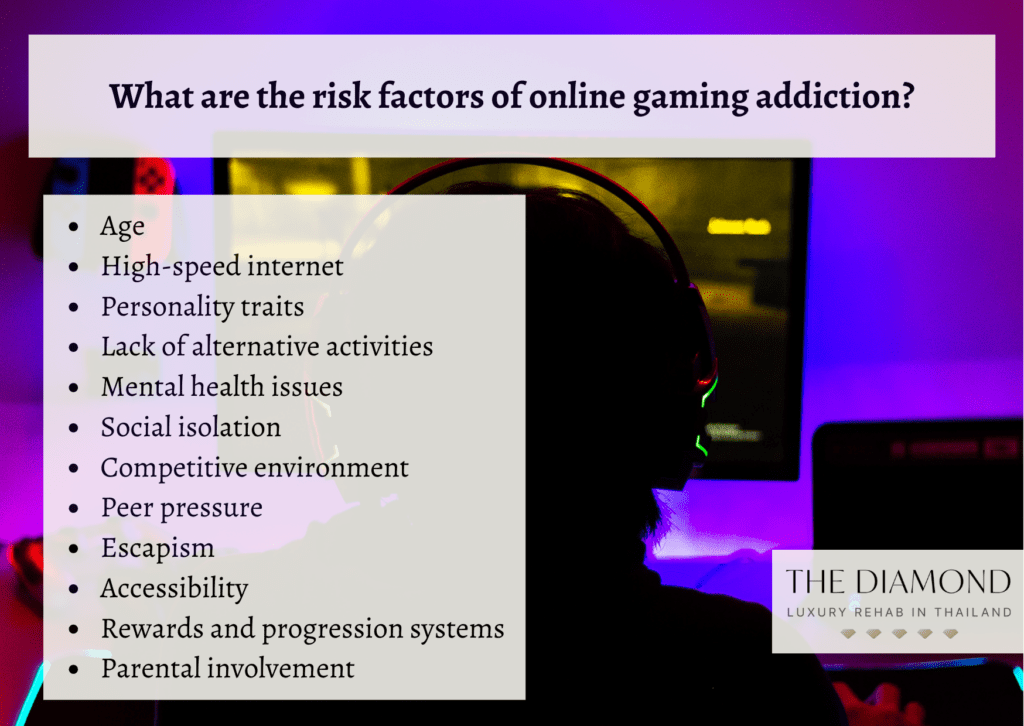
The risk factors of online gaming addiction are listed below.
- Age
- High-speed internet
- Personality traits
- Lack of alternative activities
- Mental health issues
- Social isolation
- Competitive environment
- Peer pressure
- Escapism
- Accessibility
- Rewards and progression systems
- Parental involvement
1. Age
The age at which a person is initially exposed to any addictive substance or behavior may have a negative impact on the development of an addiction, particularly if the age of exposure occurs before the brain is fully developed.
According to Singh et al. in their 2021 article published in the Industrial Psychiatry Journal, the younger a child is when starting to play games online, the greater the chances of developing online gaming addiction. This study goes on to emphasize the risk of exposing a child to video games before the age of six when their logical reasoning abilities are not fully developed.
2. High-speed internet
A high-speed internet connection is typically referred to as any speed above 25mbps (megabits per second). This speed makes online gaming enjoyable and comfortable, as there would be no lags in the gameplay.
A fast internet connection may foster internet gaming addiction by allowing continuous comfortable access to online games, allowing for longer and more immersive gaming sessions. Because of the quick data flow high-speed internet offers, gamers will also find it difficult to withdraw from gaming.
3. Personality traits
Researchers and psychologists believe there are five basic dimensions of personality, often referred to as “The Big 5”. In a 2023 research study published in the Current Opinion in Psychiatry journal, Müller et al. found that high neuroticism and low conscientiousness correlate with gaming disorder.
High neuroticism manifests in traits such as excessive worrying, feeling anxious, and getting upset easily. On the other hand, low conscientiousness manifests in traits such as disliking structure, procrastinating important tasks, making messes, and failing to take care of their environment.
However, these findings are supported and rebutted in many other studies. These are merely possible personality traits that someone who is at risk for developing online gaming addiction might exhibit.
4. Lack of alternative activities
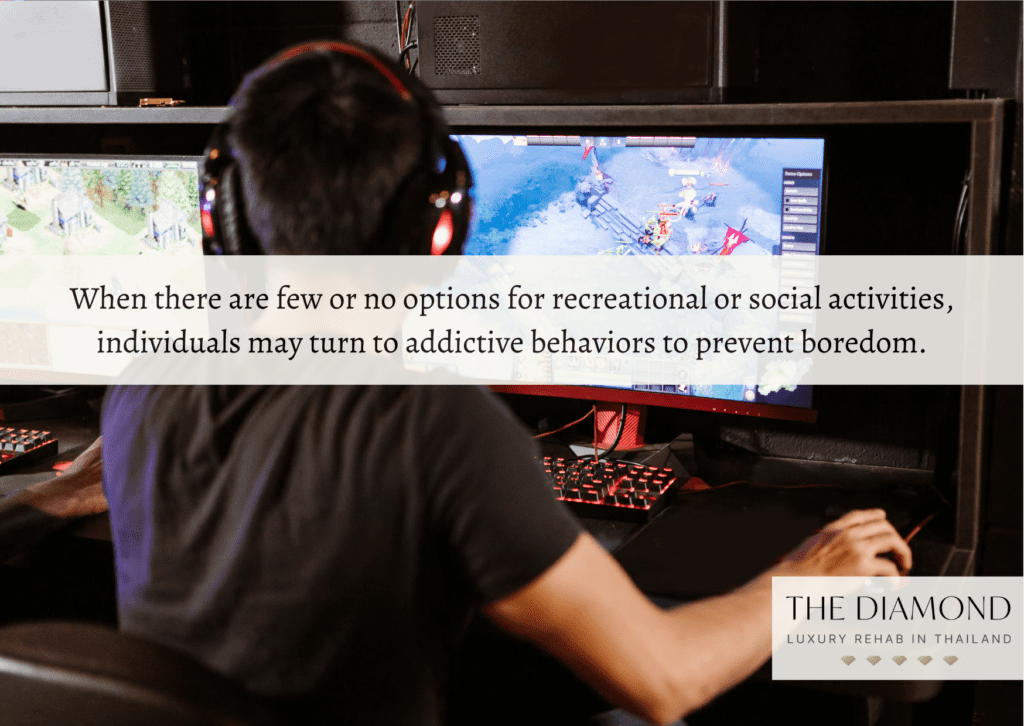
When there are few or no options for recreational or social activities, individuals may turn to addictive behaviors to prevent boredom. Gamers might turn to online gaming as a source of enjoyment and connection.
This increased reliance on gaming may result in more time spent online, possibly adding to the probability of eventual addiction. In addition, the immersive nature and reward systems of online gaming can make any alternative activity seem boring in comparison.
5. Mental health issues
Mental health issues are defined as clinically significant disturbances in one’s behavior, emotional regulation, or cognition, according to the World Health Organization. A person who suffers from mental health issues is typically more vulnerable to developing addictive behavioral and thought patterns.
Mental health issues can elevate this vulnerability to online gaming addiction by exacerbating feelings of isolation and emotional distress, leading individuals to seek solace in and escape through online gaming.
6. Social isolation
Social isolation refers to the lack of regular contact and interaction with other individuals, according to the National Institute on Aging. People with poor social skills may struggle to spend time with their peers in person.
As a result, they frequently turn to online gaming to alleviate their loneliness. Online games can be played with other players, providing a sort of social engagement that they typically feel too uncomfortable seeking.
7. Competitive environment
A competitive environment refers to the constant feeling of competing against other people. This could refer to friends or family and typically means that one person tries to do better than the other. Not all competitive environments are inherently toxic. However, it can lead to heightened stress and anxiety. Online gaming is a highly competitive activity as gamers compete to earn a place on global rankings, win tournaments, and win prizes.
A competitive environment in online gaming might raise the risk of addiction by fostering an insatiable drive to succeed and outperform others, causing gamers to devote excessive time and effort to obtaining virtual rewards or a place on global rankings.
8. Peer pressure
Peer pressure refers to the direct or indirect pressure from friends or family to influence a person’s beliefs, values, activities, or thoughts. Gamers may spend more time online in order to fit in and maintain social ties, perpetuating a loop of addictive behavior.
Peer pressure can contribute to online gaming addiction by compelling individuals to conform to the gaming habits of their peers, resulting in excessive gameplay and neglect of other duties. This can lead to neglect of real-world responsibilities and academic or work obligations and, eventually, increase the risk of online gaming addiction.
9. Escapism
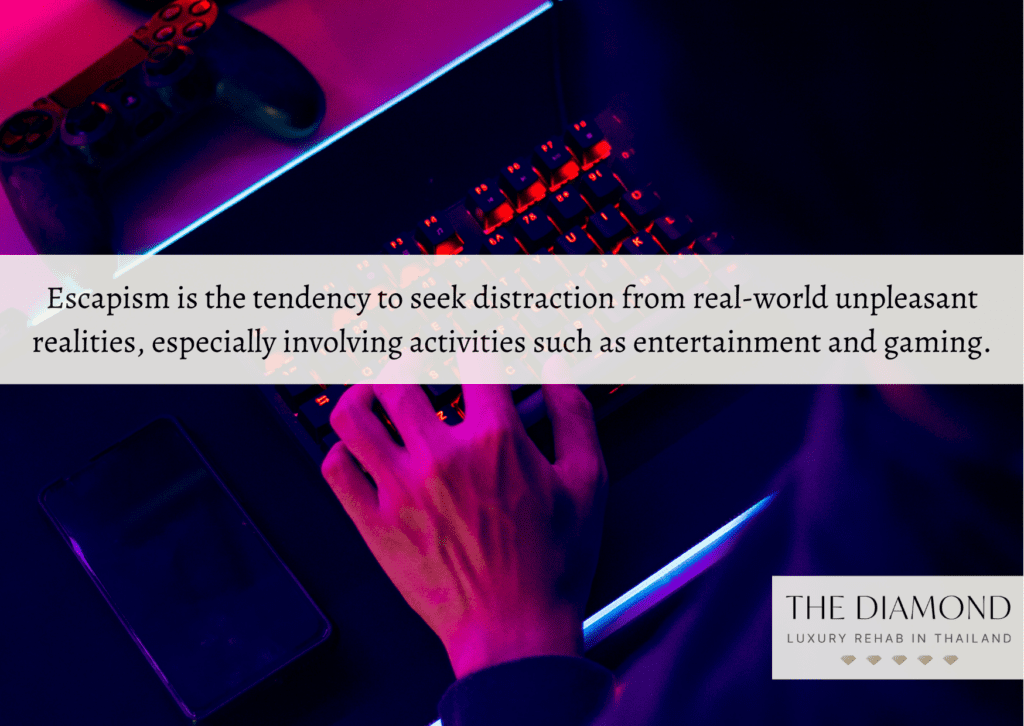
Escapism is the tendency to seek distraction from real-world unpleasant realities, especially involving activities such as entertainment and gaming. In a 2022 study published in the International Journal of Environmental Research and Public Health, Jouhki et al. found that escapism is a coping mechanism that could be indicative of risky online behaviors.
Excessive online gaming as a form of escapism from real-life issues might increase the risk of gaming addiction, as people prioritize virtual experiences over their obligations and realities. The virtual world becomes more appealing as reality becomes more unpleasant.
10. Accessibility
Accessibility in online gaming refers to the constant availability, immersive experiences, and easy access to online games. It’s very easy to access endless hours of gameplay on the internet and be completely immersed in gameplay.
However, accessibility to online gaming can escalate the risk of its addiction as the low barriers to entry and 24/7 access can easily lead to extended and excessive gameplay. The immersive environment creates a sense of escape and makes it difficult for a gamer to disengage.
11. Rewards and progression systems
Rewards and progression systems are designed to make gamers feel more motivated to complete a task in order to get a special reward. While these systems enhance gameplay enjoyment, they also initiate an ongoing cycle of gratification.
Rewards and progression systems can contribute to an online gaming addiction by reinforcing compulsive behaviors. This system motivates players to engage in excessive gameplay in pursuit of rewards and thus increases the risk of developing an addiction.
12. Parental involvement
Parental involvement refers to how active a parent or parents are in a child/teenager’s life. Both excessive parental involvement and a lack of parental involvement could be potential risk factors for online gaming addiction.
Excessive parental involvement in a child’s gaming activities may inadvertently lead to gaming addiction. Constant monitoring or pressure to succeed might lead to stress and escapism, leading the child to seek refuge in video games.
On the other hand, a lack of parental involvement might cause a parent to miss certain signs that could indicate a gaming addiction. These children might also turn to video games to escape the lack of attention they are receiving at home.
How does internet gaming addiction affect mental health and emotions?
An internet gaming addiction can lead to mental health issues such as depression, anxiety, and social phobia, according to González-Bueso et al. in their 2018 article published in the Frontiers in Psychology journal.
Excessive gaming can interfere with sleep patterns, social interactions, and daily responsibilities, worsening feelings of loneliness and low self-worth. Furthermore, the dopamine-driven reward system in gaming can cause mood swings and problems managing emotions, worsening overall mental health.
What are some of the common triggers that lead to excessive online gaming?
Common triggers that could lead to excessive online gaming include the desire to escape from real-life stressors (escapism), the allure of virtual rewards, or the desire to connect with others through a shared hobby.
Many of the risks of an online gaming addiction overlap with the triggers that could lead to excessive gaming. These triggers can contribute to the development of unhealthy gaming behaviors, resulting in obligations being neglected, sleep habits being disrupted, and interpersonal connections being strained.
Where can you seek an online gaming addiction diagnosis?
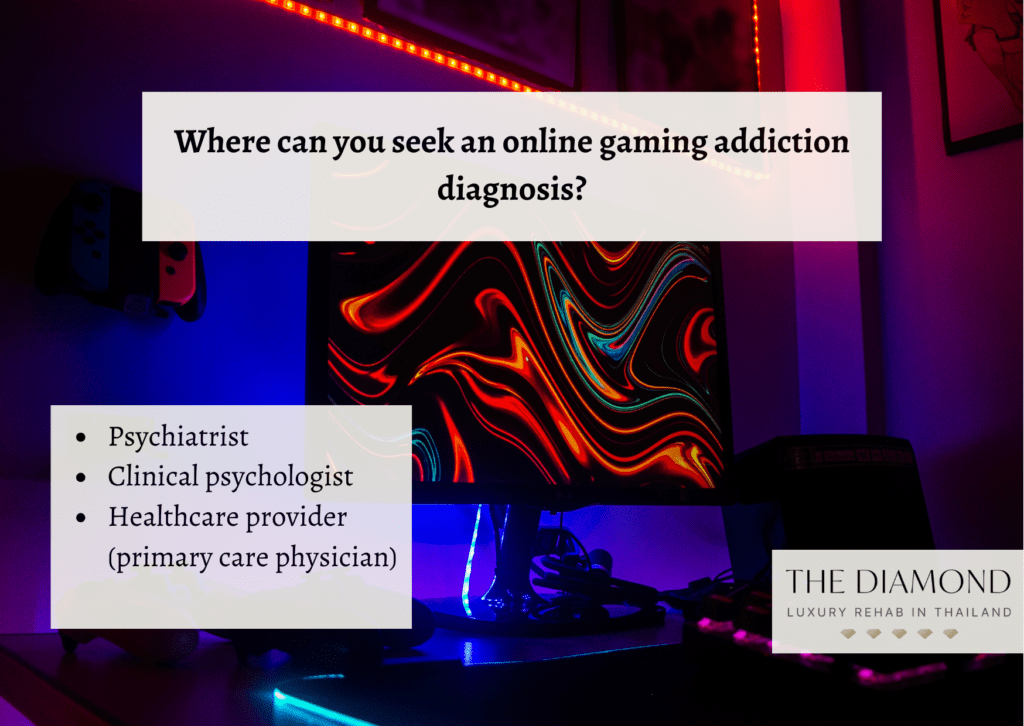
You can seek an online gaming addiction diagnosis from the following sources listed below.
- Psychiatrist
- Clinical psychologist
- Healthcare provider (primary care physician)
What are the treatments available for online gaming addiction?
The treatments available for online gaming addiction are listed below.
- Cognitive behavioral therapy: Cognitive behavioral therapy is a popular treatment option for online gaming addiction. It focuses on identifying and altering addictive thoughts related to gaming as well as introducing coping strategies to help addicts self-manage their gaming addiction.
- Group therapy: Group therapy refers to a group of struggling addicts who discuss their problems under the supervision of a psychologist. For online gaming addicts, group therapy can provide moral support and understanding, which they might lack from friends or family,
- Family counseling: In family counseling, a therapist helps the family of a gaming addict to cultivate a supportive and understanding environment. The support of family is an integral part of the recovery and management of gaming addiction, according to Han et al. in their 2012 article published in the Psychiatry Research journal.
- Medications: Mental health issues often play a role in addictive behavior patterns, such as online gaming addiction. Gamers struggling with psychological issues like depression or anxiety might find relief through prescribed medications like antidepressants, which also offer a comprehensive approach to addressing addictive gaming tendencies.
- 12-step program: Gaming Addicts Anonymous offers a comprehensive 12-step program for gaming addicts to follow individually or in groups. It leads gamers through the whole recovery process, from admitting they have a problem to making amends with peers and family.
When to seek treatment for online gaming addiction?
A person should seek treatment for online gaming addiction when they develop an obsessive preoccupation with playing online games. According to “Video Game Addiction,” a 2022 article published by Cleveland Clinic, in order to diagnose and manage gaming addiction, gaming habits must exhibit extreme characteristics that cause considerable disruptions to an individual’s personal, familial, social, educational, or professional life. Typically, these patterns need to persist for a minimum of one year.
A person should also seek treatment for online gaming addiction if they’re experiencing five or more signs of online gaming addiction for a prolonged period of time. A doctor or mental health professional will be able to provide a diagnosis and personalized treatment plan for individual circumstances.
How does cognitive behavioral therapy (CBT) help in treating gaming addiction?
Cognitive behavioral therapy (CBT) is a type of psychotherapy (talk therapy) that aims to help addicts identify and change behavioral and thought patterns. Cognitive behavioral therapy can help gaming addicts recognize the thoughts and behaviors that lead them into and encourage their addiction.
Each cognitive behavioral therapy treatment plan differs according to the individual circumstances of addicts. Typically, CBT courses usually have 6 – 20 weekly or bi-weekly sessions. A psychologist will determine how many sessions would be needed and what the expected timeframe would be. According to Han et al. in their 2020 article published in the Clinical Psychology and Psychotherapy journal, CBT is an effective treatment for online gaming addiction.
How long does online gaming addiction recovery typically take?
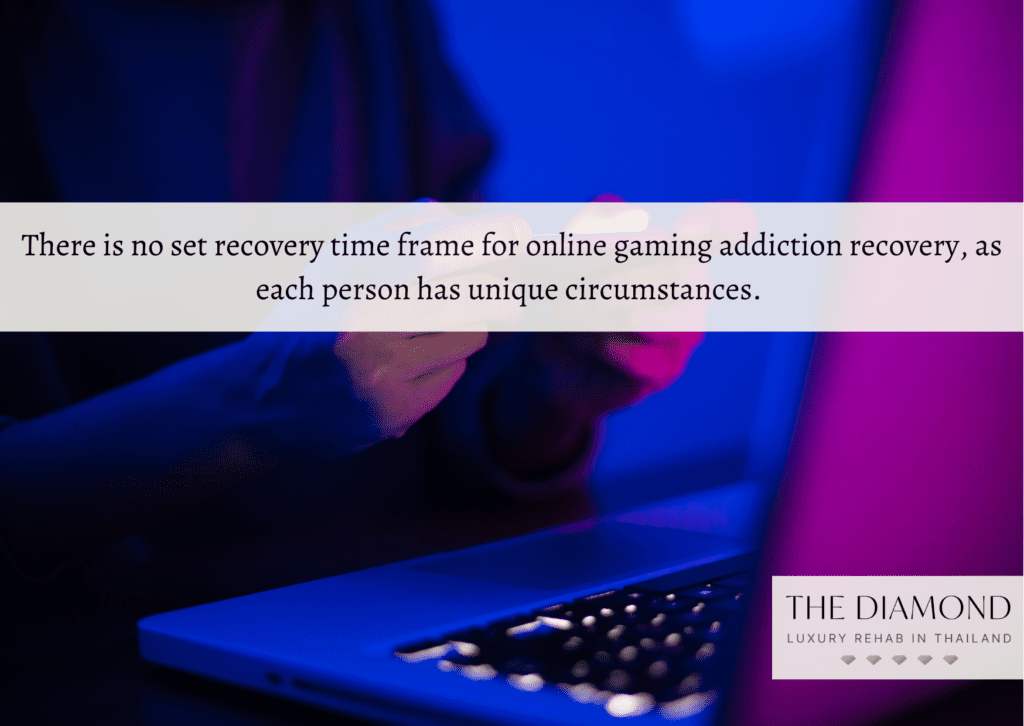
There is no set recovery time frame for online gaming addiction recovery, as each person has unique circumstances. Typically, a mental healthcare provider or a doctor will recommend cognitive behavioral therapy, which generally involves 6 to 20 weekly (or fortnightly) sessions.
In more severe instances, individuals struggling with gaming addiction might be urged to consider an inpatient addiction treatment center by their doctor. At these treatment centers, they can undergo a treatment program lasting either 30 or 60 days.
How is online gaming addiction prevented?
To prevent an online gaming addiction, set precise time limitations for playing games. These time constraints are determined by the individual’s responsibilities, such as work or family. Additionally, engage in new activities such as reading, learning new information, or photography. These hobbies will help an individual avoid becoming immersed in a gaming addiction.
Finally, establish defined goals for a career or formal education. This guarantees that the individual has something to strive for, which is an excellent motivator to restrict time spent playing video games.
Is video game addiction a serious matter?
Yes, video game addiction can be a very serious matter, especially if it interferes with one’s daily life. When addiction begins to produce mental, physical, or social issues, it is time to seek diagnosis and treatment.
According to Parmar and Lagoy’s 2021 article “Is Video Game Addiction a Disorder?” published in PsychiatryTimes, gaming addicts have lower mental health and cognitive performance, including poorer impulse control and lower verbal IQ. Excessive gaming can also increase the likelihood of psychological issues such as depression or anxiety, as well as feelings of social isolation.
What are some effective strategies for managing online gaming addiction?
The effective strategies for managing online gaming addiction are listed below.
- Remove temptations: Gaming devices should be removed from the bedroom to ensure that there are no temptations to play games that could disrupt sleep patterns.
- Set up a gaming schedule: Set up and stick to a strict gaming schedule. This should be an allotted amount of time that can be spent playing games, ideally no more than 1 – 2 hours.
- Discover alternative hobbies: Alternative hobbies and activities that can offer the same stress relief as gaming is an effective strategy for managing gaming addiction. These activities include playing sports, hiking, meditation, and reading.
- Seek Support: Individuals facing online gaming addiction should not hesitate to reach out for assistance. Whether it’s talking to a trusted friend or family member, seeking guidance from a mental health professional, or joining a support group specifically tailored to gaming addiction.
- Establish a routine: Establishing a daily routine will help gamers maintain discipline and manage their gaming habits. A routine will help prevent boredom or impulsive gaming.
How can parents effectively address and manage online gaming addiction in their children?
The strategies for parents to address and manage an online gaming addiction in their children are listed below.
- Open discussion: Parents should have an open discussion with their children about their gaming habits and inform them if they are concerned about the hours spent gaming.
- Remove temptations: Parents should remove any computers, TVs, and gaming devices from the child’s room and set up the equipment in a family-accessible room (like the TV room). This allows parents to keep an eye on and manage online gaming activity.
- Allow limited gameplay: Another tip for parents to manage internet addiction in their children is to allow a set limit of time to play games on school days and on weekends. According to Nancy Petry in her 2023 article published by the Child Mind Institute, children’s gameplay should be limited to 60 minutes on weekdays and 2 hours on weekends.
- Alternative activities: Parents should discover alternative fun activities that they can do with their children, such as camping, game nights, going to the park, etc. These activities would help children take their minds off gaming and experience other joys in their lives.
- Seek professional support: Parents should feel confident to reach out and seek professional help if they feel unable to manage their children’s online gaming. Seeking professional help might also indicate to children that their parents understand and support their struggle.
How do online gaming addiction and internet addiction relate to each other?
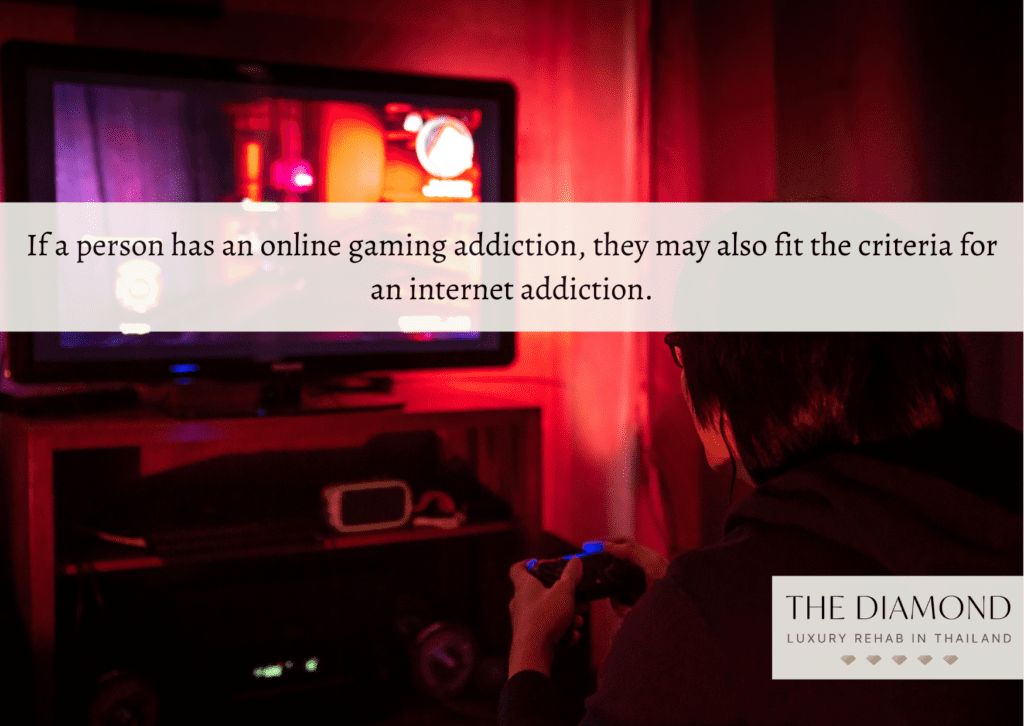
If a person has an online gaming addiction, they may also fit the criteria for an internet addiction. Internet addiction is defined as a compulsive need to spend a significant amount of time on the internet engaging in numerous activities. It can be used as a catch-all phrase for a variety of other addictions, including online gaming addiction, online shopping addiction, and online gambling addiction.
Online gaming addiction, on the other hand, is defined as consistent and recurrent participation in online gaming. However, according to Alsunni and Latif in their 2022 paper published in the Journal of Family & Community Medicine, online gaming addiction, as defined by the DSM-5, can be either online or offline, despite the term of the addiction. Thus a person who is addicted to offline video games would not fit the criteria for an internet addiction.
How does online gaming addiction relate to online gambling addiction?
Online gaming addiction and online gambling addiction share compulsive and excessive behavior patterns. Both involve the use of the internet for immersive experiences with potentially detrimental consequences.
Individuals who are addicted to online gaming become engrossed in virtual worlds, often disregarding real-life duties. Similarly, online gambling addiction involves compulsive betting and putting real money at risk in games of chance, which can lead to financial and psychological issues. Both addictions can interfere with daily life, impair relationships, and could require professional help for management and recovery.
What is the difference between online gaming addiction and video game addiction?
Clinically, there is no difference between online gaming addiction and video game addiction, as both would be diagnosed as an “internet gaming disorder,” according to the DSM-5.
However, people typically use the term “online games” for those who need an internet connection to play. On the other hand, “video games” refer to those that involve interacting with a user interface to display visuals on an electronic device, whether played online or offline.

